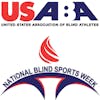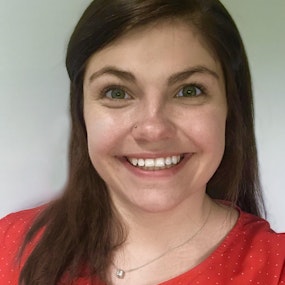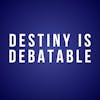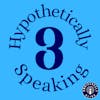
National Blind Sports Week

Cat Bouwkamp with the United States Association of Blind Athletes stops by to discuss her participation in the 2012 London Paralympics, the USABA and National Blind Sports Week...

Cat Bouwkamp with the United States Association of Blind Athletes stops by to discuss her participation in the 2012 London Paralympics, the USABA and National Blind Sports Week.
.:: Destiny is Debatable is a Cemblem production and made possible by the generous support of our listeners and Executive Producer, Erin Grimes.
John:
We're going to talk a lot about the United States Association of Blind Athletes, but I want to talk a little bit about you first. You are a Paralympian.
Cat Bouwkamp:
I am, yes. I was a 2012 Paralympian and I actually competed in the sport of wheelchair fencing. I was born with a physical disability from birth where I basically the easiest way to explain it is I am missing most of the muscles below my knee in one of my legs. And so with that, that qualified me for the Paralympic style sports. And I got involved in wheelchair fencing and immediately fell in love with the concept of being able to stab people and get points for it. So I'd have to go to jail or anything. Exactly. No repercussions for being a Three Musketeer.
John:
Wow. That's that is pretty cool. The games were in London. Do you have a good time there?
Cat Bouwkamp:
I did. So I was 16 years old. I was the youngest on my team. When I say my team that's me and these seven other wheelchair fencers that competed. So I was the youngest on my team by eight years and I was the only female on my team. So it was kind of like getting to go see a new country with all of your fun uncles, which is kind of how I always describe it.
John:
How many people were on the Paralympic Team in general?
Cat Bouwkamp:
Oh, wow. I want to say around 200 to 300.
John:
That's a pretty good amount of people.
Cat Bouwkamp:
Absolutely. And that was, that was actually what really fueled my career path was going to the London games and seeing so many people, both Americans and from foreign countries who were these high profile professional athletes, not in spite of their disability, like many of the general public sometimes assume, but they were professional athletes because of their disability. And just being able to see the empowerment and the empathy and just the community that really surrounds the Paralympic movement and Paralympic sports is what helped me to realize that I wanted to work in the Paralympic movement for the rest of eternity. And that's kind of one of the stepping stones that led me to working at the US Association of Blind Athletes.
John:
Let's pick it up there. You're the Membership and SafeSports Coordinator. What does that mean?
Cat Bouwkamp:
I am, so it is a fancy way of saying pretty much anything that has to do with our members. I am the one that gets to deal with it. I work with our members from grassroots. So I work with people who have maybe recently lost their vision or their vision is failing them. And they are looking to get involved in sports wherever they are across the U S but then on the other hand, I also get to work with our Paralympic sport of goalball and work with those athletes to make sure that they're all in compliance with their safety measures. So I really get to run the whole gamut and I think maybe biasly, but I get to have the most fun at USA BA because I get to really have that hands on interaction with the entire span of our membership.
John:
What is the USABA and who's the target member?
Cat Bouwkamp:
Yeah, so that's kind of a hard question because our goal at the us association of blind athletes is to create and facilitate opportunities for people of all skill level, who are visually impaired to live a healthier and happier lifestyle. So whether that is someone who has lost their vision recently and is just looking for opportunities or even the how tos or whether that is someone who ran marathons competitively has slowly started losing their vision, wants to get involved in that capacity, or whether it's someone who's vying for the Paralympic team. That's the beautiful part of USA BA is that we are creating, and we have a community of athletes with visual impairments at all ability levels, so that we can create kind of this. It is such a niche community of people who are interested in being healthier and happier who also happened to have a visual impairment.
John:
I imagine it is. Yeah. So it sounds like you run the gamut from all kinds of visual acuities and all ages then.
Cat Bouwkamp:
Yeah. So it's interesting. One of our programs that I run is called United. We moved and it kind of sprung out of the COVID pandemic. And when all of our in-person programming ceased to exist, we created a virtual program that utilizes Fitbits. And we have people who are registered all across the US who use these Fitbits to track their steps and their active minutes. And they compete in challenges with each other and have a community on social network. And so our youngest participant is 12 years old and our oldest participant is 72 years old. And then when you look at the fact that that program is represented in 33 States, the weight range of our participants also goes from 85 pounds to 370 pounds. So we really pride ourselves on being a niche organization for everyone. It's kind of the fun way. I like to explain it. You know, we are for people who are seeking this type of lifestyle, but it doesn't matter where in their journey for that lifestyle they're at. So we really serve everyone. And specifically within that in membership with USA BA provides the opportunity to get involved in programs like that. And so that's just kind of one of the many benefits that comes with being a USA BA member is the ability to get involved with people, either a who seem to live a similar lifestyle to you and seem to be almost like you in every way on paper. And it's also to create a community around our differences. So to be able to span that age gap or that demographic gap or that weight gap or whatever it may be to create a more diverse community,
John:
You've wet my appetite here. I'm not a member. Maybe I should be. I'm certainly an amateur at, at a, at a few things and terrible at others, but membership is like a, there's a, there's a fee for that on an annual basis. And then you get plugged into the network of other blind athletes that at whatever level you think you fit into,
Cat Bouwkamp:
To an extent. Yeah. So with our membership, it's, you have the option to either pay a annual fee like you mentioned, or for our athletes who, once they have, really gotten their foot in the door and realized how beneficial our organization can be to them, there is a lifetime membership and where you are a member for life. But it equals out to four years of membership. So it's really just a cost benefit analysis on that side of when you weigh the benefits that you can receive from USABA in terms of programs, in terms of information that we communicate every two weeks in our newsletters in terms of the programs both closed and open. So what that means is we've done programs on our Facebook, where our Paralympic athletes will create workout videos, and anyone who follows our Facebook can participate along with them. And they also get the opportunity to participate in close programs, which are programs that are just sent out to our members who are registered. So there's something for everyone with a USABA membership.
John:
Yes. It sounds like there are lots of things available. So there's lots of programs and sports, where do they generally occur? It sounds like maybe somewhere online or virtual, but physically, where do they occur and what are the main sports that are participated in?
Cat Bouwkamp:
Yeah, so we have what's called a sport club network, and that means we have a list of local partners all across the U S who facilitate programs independently, but kind of under our USA BA sport club umbrella. So we have global teams in Seattle, Atlanta, DC, Columbus, everywhere across the U S we have different programs available to all of our members. And then specifically for some of our members who are in that more rural or less connected cities is when we really do encourage the participation within the virtual programs. But we do have programs across the U S in terms of sports that we offer. We are the high performance management organization or H PMO for the sport of goalball. So what that means essentially is the Paralympic sport of global played in the U S is housed under the US Association of Blind Athletes. So when you see team USA, Paralympians competing in the sport of goalball, that is one of our programs that we facilitate and that we are most proud of. We also facilitate eight other sports. So we are also what is called a multi-sport organization. And so we offer cycling, skiing, powerlifting, paratriathlon, global soccer, track, and field and swimming. So we offer programming and all of these sports throughout the year, whether that be a onetime camp or in the case of goalball, since we are the management organization for that sport, we do four regional tournaments and a large national tournament every year with COVID obviously things have changed in that front, but that is kind of what we consider to be our baby. And so we facilitate a lot of programming in the sport of goal ball, but we also like to provide the most opportunities to our members and athletes. So we also provide programming and those seven other sports.
John:
You've mentioned goalball a few times. I don't know what that is. Explain please.
Cat Bouwkamp:
As part of global is it's very hard to explain. It is somewhat similar to three on three soccer, except your team does not move from the goal box. So to imagine it is an indoor courts for it played on a volleyball court, and you have goals on either end and you have three people on each team who are in front of the goal for each team, because in the blind and visually impaired community vision, visual acuity can range so greatly. There is this equalize playing field by everyone wearing eye shades. So completely darked out, no one can see anything. So the playing field is completely level and the gold ball itself is this large. It's almost the size of a bowling ball, but it's made out of thick rubber. And it has essentially bells and ball-bearings inside of it to make noise when it is shaken or thrown. And the point of the sport is to score a goal in your opponent's goal, but obviously your goal in the game is to defend your goal. And so it is a very high speed back and forth of strategically hurling the ball down the court to score against your opponents while they can hear the ball coming and have to react to defend their own goal. So that is a very large overview and somewhat messy explanation of this sort of Goldwell.
John:
Are you using hands and feet or one or the other?
Cat Bouwkamp:
Yes. You can use your hands and your body when you are on defense. You're essentially in a kind of squatting or hands and knees position. And when you hear the ball coming, you have to be able to identify where on the court the ball is. So there's no talking by anyone in the stands or anyone on the throwing team. You have to be able to identify on defense where that ball is coming from so that you can essentially spread out or shoot your body out like a bean stock and lay on your side so that you can defend as much of the goal as possible while still being, being able to identify where the ball is at. So you don't get hit in the face or break a finger or something of that nature. It's a very technical sport. And I wish I could explain it a little better, but that is the general just of the sport.
John:
I think I get a pretty good visual about that. As you mentioned, a visual acuity can vary quite a bit. So who qualifies for the USA? BA it sounds like maybe anybody with any kind of visual challenge would qualify. I was looking on the website, there are some classifications of athletes. How does that work?
Cat Bouwkamp:
In the international Paralympic realm there is the overarching organization that oversees blind and visually impaired sports called IBSA. And they have three visual qualifications that really span across all sports that have a visual impairment category within their sport. And they may be called something differently. So in goalball, they're labeled B1, B2, B3, but then in track, it's T11, T12, T13. It's the same classification system across all sports. They just sometimes have slightly different names, but we recognize the three IBSA classifications, which are B1, which is no light perception in either eye up to light perception and an inability to recognize the shape of a hand at any distance or in any direction. So this would be your most severe visual impairment or blindness. And then moving up, we had to B2, which is from ability to recognize the shape of a hand up to visual acuity of 20/600 and, or a visual field of less than five degrees in the best eye with the best practical eye correction. And then moving up from there. The third IBSA visual classification is B3 from visual acuity above 20/600 and up to visual acuity of 20/200 and, or a visual field of less than 20 degrees and more than five degrees in the best eye with the best practical eye correction. I know those are a little technical, but typically the majority of our athletes fit into one of those three categories. And those are the three categories that are recognized internationally by IBSA. To reach the largest number of people with visual impairments in the U S we have a fourth classification called B4, and this is from visual acuity above 20/200 and up to visual acuity of 20/70, and a visual field larger than 20 degrees in the best eye with the best practical eye correction. So again, this is, that B4 is a classification that could not necessarily compete in the Paralympics, but that we include in our programming because we want to embrace the largest number, largest amount of people possible.
John:
So I am 20/300 in one eye and no light perception or zero vision in the other. Based on what you were just saying, it sounds like I probably fall into like, B2 or B3, one of those two.
Cat Bouwkamp:
Yes. So that, again, that is somewhat of a tricky one. You would most likely fall into the category of B3
John:
What is the best or most popular sports, I guess that the U S ABA
Cat Bouwkamp:
The most popular sport would be the sport of goalball, because we are that high performance management organization. That is again our baby. And so we facilitate the most amount of programs in that sport, and we definitely see the most involvement from our members in that sport as well.
John:
Some other sports cycling, I think was one of them. I'm interested in knowing more about what opportunities and programs are available for cycling.
Cat Bouwkamp:
Sure. Yeah. So in a non COVID year we host two in person cycling camps and at the Olympic and Paralympic training center in Colorado Springs. So what that kind of looks like is we bring in athletes who are interested in the sport of cycling, or who have dabbled in the sport of cycling and want to kind of increase their grassroots skills. And we bring them in, get them on a tandem bike, kind of really just help them hone their skills of cycling here at the Olympic and Paralympic training center in Colorado Springs with some of our national staff.
John:
Is it possible to find pockets around the country of cyclists that would be members of the U S ABA?
Cat Bouwkamp:
Absolutely. So one of my, again, roles as the membership coordinator is anyone who is interested in learning I'm in Indianapolis, Indiana. And I want to learn about visually impaired bowling. That's the kind of thing that someone would reach out to me. And I would be able to connect them directly to either someone who is in their area and performing that sport or service, or I would be able to connect them with someone on the national level who would be equipped to do such a thing.
John:
Is there anything else that we've missed about the USABA in general,
Cat Bouwkamp:
We really just span a wide gamut of both sports and a wide gamut of members. And we're excited to hopefully have more members.
John:
And where does somebody become a member? What's the best way to do that?
Cat Bouwkamp:
Absolutely. So if you wanted to become a member, you would go to www.usaba.org. And then from our homepage, you would be able to find the link to help you join as a member.
John:
Let's talk about the real reason we're here today is the beginning of national blind sports week.
Cat Bouwkamp:
It is indeed happy national blind sports week!
John:
Tell me everything you can about that.
Cat Bouwkamp:
Sure. So national blind sports week, again, is something that kind of stemmed out of this need for virtual programming from COVID and the danger that in person programming can cause to give you a little history. First, this is the third annual national blind sports day event and national blind sports day is a hopefully to be nationally recognized holiday on October 3rd. And so this is the third year that USA is doing programming for national blind sports day. But because we can't have that in-person programming aspect, we have created national blind sports week, which is a week long virtual experience that we'll be able to provide athletes, parents, coaches, teachers, anyone who is interested in sports for blind and visually impaired athletes, the resources to get involved in any sport, their heart could desire. We have five days of sports specific webinars. What I mean by that is today, we will have some youth specific webinars hosted by one of our emerging stars, which is a youth USABA athlete who has showed incredible promise in the blind and visually impaired sports world. And so she will be presenting on kind of what it's like to be a youth athlete in USABA where she got started and where opportunities are tomorrow will be a gold ball day where you can join along with our USA global national team coaches, as they do a educational webinar, they do a live scrimmage at our US Goalball Center for Excellence in Fort Wayne, Indiana, and our resident team program. There will be a Facebook live Q and A with some of our athletes. And then tomorrow night we will also have resource webinars. So those are webinars that are not necessarily sports specific, but that are relevant to our community as well as relevant to just people interested in learning more about how to navigate the sports world.
John:
Those events are taking place on Facebook, exclusively, or on the usaba.org website, somewhere else?
Cat Bouwkamp:
All of the above. So we had a registration process beforehand, and those who were able to register would be able to hop on our zoom sessions to be able to ask questions in real time. But for those that didn't have a chance to register, that is absolutely okay because we are going to be Facebook live streaming. All of our zoom sessions, the sessions will be available live in real time on Facebook, as well as available for those who registered on Zoom.
John:
It sounds like Facebook is a good place to go if you haven't already registered.
Cat Bouwkamp:
Exactly. If you want to head to our Facebook, it is just the US Association of Blind Athletes.
John:
Okay. We'll see you there then. I'm sure there's some opportunities for volunteers on these types of things that all the in person stuff. Do you have a place for those types of people to go to register to?
Cat Bouwkamp:
I'm glad you asked John the greatest part about National Blind Sports Week ending on national blind sports day is that, you know, we were all incredibly bummed that we can't do our large National Blind Sports Day in person programming, but what we can do and what we are doing this year is we are having a plethora of people, host virtual events on Saturday, October 3rd. So what's that what that will look like is people from all across the U S we'll be hosting virtual workouts, virtual seminars, virtual skills clinics. And so for those who are interested in getting involved on the facilitation or the volunteer side, that is the perfect opportunity for someone to kind of help out with national blind sports week, as well as being able to make a difference on national blind sports day itself, to find out more about National Blind Sports Week and National Blind Sports Day, you can go to our website at www.usaba.org/blindsportsday. And that will give you our most up to date schedule. That'll let you know when everything is going on, as well as how to view all of our Facebook live webinars, Q and A's and everything in between. So go on and check it out.
John:
And will we see Cat Bouwkamp at any of those events?
Cat Bouwkamp:
You betcha. I will be moderating 75% of these events. So I'm sure if you stop by, I will be there.
John:
Wow! You're going to be busy this week.
Cat Bouwkamp:
That is the plan.
John:
Well, thanks a bunch for squeezing us in Cat. It's a pleasure visiting with you. And I'm excited about blind sports a week and excited about the USABA. And I think I'm going to become a member myself.
Cat Bouwkamp:
Well, I'm so glad to hear it, John, and thank you so much for letting me share about this awesome National Blind Sports Week. And I look forward to meeting some of your listeners during the week.

Cat Bouwkamp
Membership and SafeSport Coordinator at USABA
Cat Bouwkamp is a 2012 Paralympian in wheelchair fencing. She is a graduate of Indiana University with degrees in recreational therapy and nonprofit management, and was the co-founder of the first adaptive sports program at IU and has a passion for the Paralympic movement.
In her free time, Bouwkamp likes to read, play card and board games, and go on hikes with her dog and boyfriend. She began her duties with USABA on January 2, 2020.










